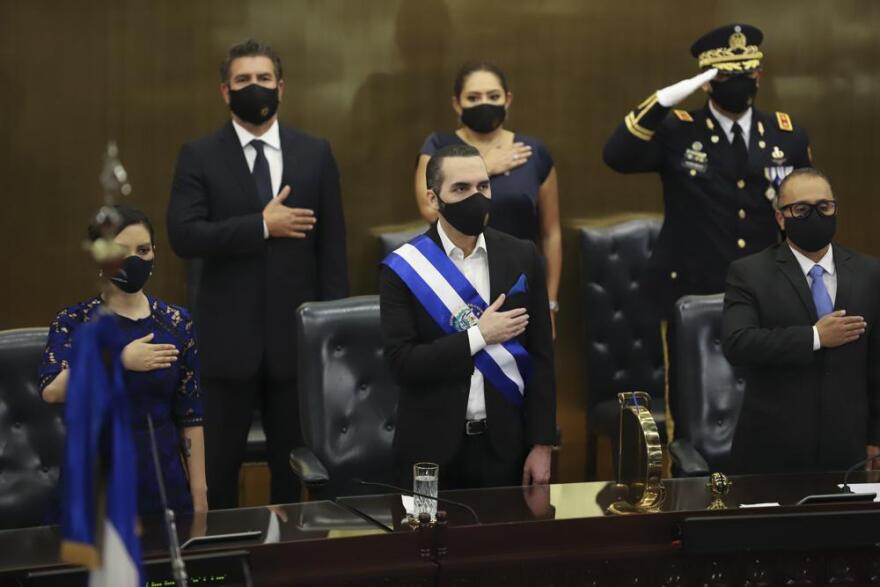Few parts of the world have suffered as badly from the COVID-19 pandemic — from death rates to unemployment rates — as Latin America and the Caribbean have.
In 2021 that also put heavy political strain on the region, especially in countries with strong ties to South Florida such as Colombia, Cuba, Haiti.
As the pandemic continues, you can rely on WLRN to keep you current on local news and information. Your support is what keeps WLRN strong. Please become a member today. Donate now. Thank you.
WLRN Americas Editor Tim Padgett looked back at the year in Latin America and the Caribbean with Florida International University's Eduardo Gamarra, an expert on the region and its politics.
Here are excerpts from their conversation, edited for clarity.
WLRN: Happy New Year, Eduardo.
GAMARRA: Happy New Year, Tim.
So we both chose our top three stories of the year in Latin America and the Caribbean. Your number three pick is the region’s worsening migrant and refugee crisis — something we sadly got a reminder of earlier this month when more than 50, mostly Central American, migrants were killed in a truck crash in Mexico while making their way north.
READ MORE: Latin America and the Caribbean 2020: From COVID-19 Devastation to Cuban Artist Defiance.
I think it’s important to appreciate the magnitude of this crisis right now. For example, anywhere between six and eight million Venezuelans have left Venezuela as a result of the collapse of the country’s economy and democracy. And they have essentially affected domestic politics wherever they have gone.
In Colombia, it has generated significant backlash; in Peru and Ecuador; in Chile, a significant rise in xenophobia — as candidates campaigned [this year] on the basis of sending these migrants back.

And of course you can say the same thing about the migrant crisis in Central America — which is now a global phenomenon, like the Haitians that are coming up through the Central American caravan, or African and Middle Eastern refugees. The impact politically has of course been felt here in the United States. And this is all likely to get worse.

My number three pick is somewhat happier: Much of Latin America turned the region's COVID vaccination tragedy into triumph. Last March, Brazil had administered only three vaccine doses per 100 people, compared to 18 per 100 people in the U.S. But at the start of this month, Brazil had two-thirds of its population fully vaccinated; so did hard hit Ecuador. In Chile, 84 percent; Cuba 82 percent; Uruguay 76.

The shame is that in many countries, health care officials had to overcome the vaccine obstruction of leaders like right-wing Brazilian President Jair Bolsonaro or left-wing Mexican President Andrés Manuel López Obrador — and also, Eduardo, the fact that the U.S. and other developed countries didn't donate more doses to Latin America sooner?
I think you're right, and it's something that several Latin American countries have pointed out. But then again, there hasn’t been a tradition of doing this kind of grand-scale donation of vaccines, and so I think the Biden administration has been playing catch-up.
Your number two story was also COVID- related, and that's the deep economic hole the pandemic dug for most countries.

The region as a whole was utterly unprepared for such a pandemic. Latin America was already facing an economic downturn with the slowdown of their export markets. More importantly, this is a part of the world with a very high number of people in the informal economy [who can’t afford to go on economic lockdown]. And you have to understand that, relative to the U.S., the ability of all but a few of these countries to provide economic stimulus to keep people out of poverty [during a pandemic] or out of absolute hunger is not very high.
So trying to enforce shutdowns made things even worse — and the economic impact, of course, ended up being drops in GDP on average of about eight percent.
My number two pick is Cuba. We saw street protests elsewhere in the region, especially in Colombia. But the anti-government demonstrations that erupted all over Cuba in July — fueled by anger over shortages of just about everything, especially human rights, not to mention a protest anthem, "Patria y Vida," that won the Latin Grammy for song of the year — were unprecedented.

Still, we also saw the communist regime’s predictable, iron-fisted crackdown. So will the unrest lead to any real change to the island's ramshackle economy or its political repression?
I don’t think so, largely because the international community today lacks any kind of capacity to force regimes [like Cuba’s] to change their behavior, especially on the human rights side, let alone bring about the end of those regimes.
The trend toward authoritarian rule in the region became even more serious in 2021 — and it's not a left or right issue any longer, a case in point being Salvadoran President Nayib Bukele.Eduardo Gamarra
This is a good segue way to your number one story of the year in Latin America and the Caribbean: how threatened democracy became in the region again. How serious is the new trend toward authoritarian government?
I think it's very serious. Of course, we have the left-wing regimes in Cuba, Venezuela, Nicaragua. But this is not a left or right issue any longer — a case in point being President Nayib Bukele of El Salvador [where a Congress he controls summarily removed Supreme Court justices this year who oppose his agenda, including presidential re-election].
He showcases that trend toward the concentration of power in the executive, especially control over the judiciary and how justice is doled out in the region. We’ve got a similar situation in Brazil with President Bolsonaro.

The U.S., especially with its recent democracy summit, is trying to say, “Look, we have to counter this authoritarian trend,” but it's a very big task.
Just consider the fact that in Bukele’s case, most Salvadorans appear to be satisfied with what he’s doing. Or look at the sham [November] re-election of [authoritarian President] Daniel Ortega in Nicaragua – which got extraordinary support from other countries in the region like Cuba, Venezuela and Bolivia and a conspicuous lack of condemnation from countries like Argentina.
My number one story is Haiti: the still unsolved assassination of President Jovenel Moïse in July; a major earthquake in August; economic implosion — and the takeover of much of the country by violent, ransom-kidnapping street gangs. In fact, many Haitians right now consider gang alliance leader — and former cop — Jimmy "Barbecue" Cherizier the most powerful man in the country.
FREE FALL
Failed state doesn’t seem a strong enough term to describe what's happened to Haiti. What, if anything, can the U.S. and international community do at this point to stop the country's free fall? And should the Biden administration as a result be deporting Haitians back to the country?
No, it makes no sense deporting Haitians to a country in that state. There really is no government there right now. There is a lot the U.S. and the international community should do, but aren't doing. They first have to solve the public security collapse in Haiti before new elections can be held. But so far there's been no real call for action. And unless there is a call for action, 2022 could result in something even worse.
Then let's hope for a better 2022.
I hope so, Tim.






